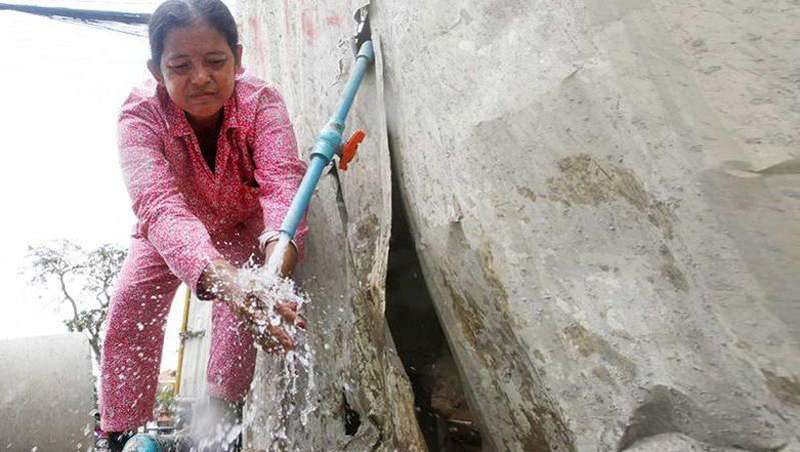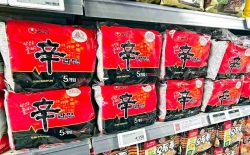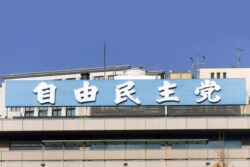
A woman washes her hands with tap water provided by state-owned utility Phnom Penh Water Supply Authority, in the capital’s Daun Penh district on March 1.
18:18 JST, March 11, 2022
Low water flows in the Mekong River are to blame for the lack of clean water supply in Phnom Penh and surrounding areas, a senior official said, while also expressing optimism that the issue might be resolved next year when several clean-water facilities are slated for completion.
Phnom Penh Water Supply Authority (PPWSA) director-general Long Naro said at a press conference on March 1 that the record-low levels of water in the Mekong River in the last five years have been identified as one of the main causes of the clean water shortage plaguing the capital and Takhmao town in neighboring Kandal Province.
Naro noted that water had recently dropped up to 1 meter below the river’s usual levels. The PPWSA had determined that the river water must reach 3 meters during the dry season to enable the pumping of water to its treatment facility, where it can then be supplied to households. At the moment, the water level stands at just 2 meters, he said.
He added that there is currently a shortage of between 1,000 to 2,000 cubic meters of water that has to be pumped into the treatment facility per hour to ensure a constant supply of running water.
However, he expressed confidence that the capital will have enough running water starting from the beginning of 2023, as several clean-water facilities that are currently under construction are slated for completion around that time.
Dry season lasts from January to May each year, during which the amount of running water falls — causing the water supply to be delayed and, in some cases, completely lacking in areas to the west of Phnom Penh, such as in the Kambol district.
Naro said the clean-water supply in the capital had once reached 100%, but it fell back into a shortage in recent years after the government transferred the responsibility of several communes in Kandal Province to the Phnom Penh Municipal Administration, causing the availability of clean water to fall to just 85% of all households.
The PPWSA has recently managed to increase the supply of clean water to 92% of Phnom Penh’s 670 square kilometers.
Having just returned from a workshop on clean water supply in Britain, Naro noted that there is a global water shortage that can be attributed to drought, and in the case of Phnom Penh.
“As we all know, we don’t see Cambodians complain about the lack of water during the rainy season, but when the dry season starts in January, we are not able to pump enough water from the river. Only after this period [ending in May] can we pump enough water,” he said.
PPWSA has managed to increase the water supply capacity from 592,000 cubic metres per day to 635,000, but it is still well below the daily requirement in 2020 and 2021 of 800,000 cubic meters as estimated in a study by Japan International Cooperation Agency (JICA).
Naro pointed out the fact that Cambodians use “a lot of water — up to 200 to 280 liters per day on average, while the global average use is only around 150 liters per day.”
“During this dry season, PPWSA appeals to all residents to use water economically. We’ve already issued a writing appeal,” he said.
Another factor that has contributed to the shortage of clean water is population growth in the capital, he said, pointing to issues such as the water pipeline to the Kambol district being too small relative to the size of its population. He said that works are ongoing to resolve this issue.
“In early February, we had some issue in Takhmao town and the west part of Phnom Penh, which we had partly solved. But Kambol district is still facing issues. In January, some residents there had voiced their concerns about the inadequate water supply,” he said.
Naro added that the government had reserved a plot of land in the Kambol district’s Boeung Thom commune to construct a clean water treatment facility which has the potential to produce up to 5,000 cubic meters of clean water per day. When the facility is ready in early 2023, the chronic lack of water in the west of Phnom Penh might no longer be an issue, he said.
The PPWSA will sign an agreement on March 7 to construct another clean-water treatment in Takhmao town with the assistance of a grant from the Japanese government. The facility is expected to produce about 3,000 cubic meters per day once it is in operation.
“We will have enough clean water for use then. In early 2024 at the latest, we guarantee that there will be no water issue in Phnom Penh anymore,” he said.
A total of $690 million has been spent on increasing the water supply capacity from 63,000 cubic meters per day in 1993 to 592,000 cubic meters in 2020, according to the PPWSA. Four water treatment facilities have been constructed to supply water to more than 3 million residents in the capital, including 2.28 million permanent residents and nearly 1 million provincial migrant workers.
Areas that still lack clean water are the Kambol district, Takhmao town and the Prek Ho area, according to Leng Khieu, chairman of the Cambodian Water Supply Association (CWA).
“We have contacted water authorities to solve the problem. They told us that they were solving the issue, but we haven’t heard news about how far they have gone in solving it so far,” he told The Post on March 1.
Khieu urged the water authorities to fix the shortage as soon as possible because residents were in dire need for a constant supply of clean and safe water.
Top Articles in World
-

Israeli Ambassador to Japan Speaks about Japan’s Role in the Reconstruction of Gaza
-

Videos Plagiarized, Reposted with False Subtitles Claiming ‘Ryukyu Belongs to China’; Anti-China False Information Also Posted in Japan
-

North Korea Possibly Launches Ballistic Missile
-

Chinese Embassy in Japan Reiterates Call for Chinese People to Refrain from Traveling to Japan; Call Comes in Wake of ¥400 Mil. Robbery
-

Russia: Visa Required for Visiting Graves in Northern Territories, Lifting of Sanctions Also Necessary
JN ACCESS RANKING
-

Japan PM Takaichi’s Cabinet Resigns en Masse
-

Japan Institute to Use Domestic Commercial Optical Lattice Clock to Set Japan Standard Time
-

Israeli Ambassador to Japan Speaks about Japan’s Role in the Reconstruction of Gaza
-

Man Infected with Measles Reportedly Dined at Restaurant in Tokyo Station
-

Videos Plagiarized, Reposted with False Subtitles Claiming ‘Ryukyu Belongs to China’; Anti-China False Information Also Posted in Japan























